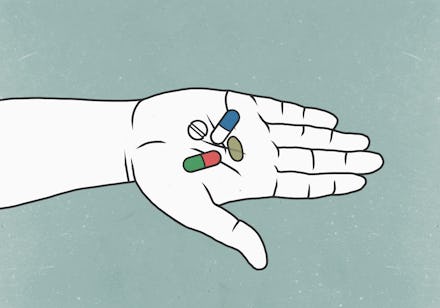Are there any drugs I shouldn't mix with my COVID-19 vaccine?

This last week in a tiny pharmacy, I was vaccinated against COVID-19 — a once in a lifetime upgrade, via Moderna. The shots from Pfizer-BioNTech, or Johnson & Johnson would also have been welcome, too, of course. While I waited for my turn to get jabbed, I suddenly tried to remember how much wine I drank the previous evening at dinner. I also knew that in a few hours, I’d be jonesing for a gummy, or a Tylenol, or something to alleviate the inevitable arm pain that would follow. Was all of this okay though, or are there any vaccine drug interactions I should know about? If I was wondering this, you might be too. So I decided to consult some medical experts about which meds, if any, would cockblock our savior of a vaccine.
Prescription meds
“Most medications people take for their medical conditions are perfectly fine to continue if they are getting the COVID vaccines,” says William Li, a Cambridge-based physician and vascular biologist who has been studying the pandemic through The Angiogenesis Foundation. Li says there are some exceptions, though: Patients who have had an organ transplant and are taking immunosuppressant drugs know that they can interfere with the body mounting an antibody response to the COVID-19 vaccine.
OTC anti-inflammatory drugs and pain relievers
Drugs like anti-inflammatories (e.g.: Advil, Motrin, and Aleve) have been previously shown to limit the effectiveness of vaccines, as The American Society for Microbiology found in a January 2021 study in ScienceDaily. “Because of this, it is likely that taking such drugs right before receiving a vaccination shot will make the COVID-19 vaccines slightly less effective,” says Kerry McGee, a Pittsburgh-based pediatrician and writer for medical site GoodRX.
Another type of over-the-counter drug to stay away from before the jab: Non-steroidal anti-inflammatory drugs like ibuprofen or acetaminophen. “They may blunt the effect,” Li says. Afterwards, you can take these NSAIDs — to relieve any arm pain or muscle weakness that are common vaccine reactions afterwards. Glad to hear that — since my arm still hurts a little.
“At that point, the vaccine has triggered the needed effect in your immune system,” Li says, adding that over the counter pain relievers are just reducing the discomfort from cytokines, which cause inflammation after the vaccine, being generated as your body is responding properly.
Immunosuppressants
For others taking immunosuppressants, however, McGee tells me Pfizer-BioNTech and Moderna included people taking a variety of medications in both their trials, anPeople with a number of different medical conditions including lung disease, heart disease, liver disease, diabetes, cancer, HIV, and obesity and were included specifically to evaluate the vaccines’ efficacy.
“Other immunosuppressant drugs, like steroids, are also known to blunt the immune system’s ability to respond to vaccines,” Li continues. A recent study from France published in the French journal Transplantation showed in 101 patients who had kidney transplants that those taking an immunosuppressant anti-rejection drug called belatacept had a substantially lower than expected antibody and T cell response to both doses of the Pfizer mRNA vaccine.
Also, people with cancer may also be taking medications that suppress their immune system, but they are generally cleared to get jabbed. Every medical expert I spoke to for this story agreed: Even if it works half as well, it’s better to protect yourself, even if the protection is slightly less so.
Recreational stuff
Maybe you enjoy a pot brownie or a whiskey after dinner, or maybe you’re managing alcoholism or another addiction; some drugs — but not all — could have an effect on how your body processes the coronavirus vaccine.
“The current vaccines from Moderna, Pfizer, and J&J could have lower efficacy in patients that regularly use alcohol or illegal drugs,” Marchese says, adding that for one, chronic alcohol use weakens the immune system, not only increasing the risk of infection but decreasing the amount of antibodies you produce. “Since the vaccines rely on a healthy immune system, drug and alcohol users should speak with their doctor about cessation plans and the best time to receive the COVID-19 vaccine,” he says.
Alcohol and drug use wasn’t a consideration when developing the COVID-19 vaccines, but prior data suggests heavy substance abuse can affect vaccine efficiency. “A glass of wine or a beer won’t hurt, but heavy consumption of liquor may interfere,” Li says pointing out that since alcohol also can cause you to be dehydrated, and you’ll get over the vaccine reaction faster if you stay well hydrated. Recommendations for other vaccines suggest avoiding heavy alcohol use about a week before the first dose and roughly a month after the second dose. A note: headlines (like mine) have been reporting on a rise in liver disease for young women since the start of the pandemic, it’s harder for some people, so check on the ones you love.
A side note for my weed enthusiasts: Marijuana use, specifically, hasn’t been shown to have an adverse effect on the vaccine, as of yet. Further, scientists are ploughing into the possibility of cannabis as a treatment for COVID-19, so put that in your bong and smoke it, I guess?
Whichever brand you get access to for your COVID-19 vaccination is the right one. Just hold off on the pain killers until after you get vaxxed, and talk to your doctor if you’re concerned about anything else.